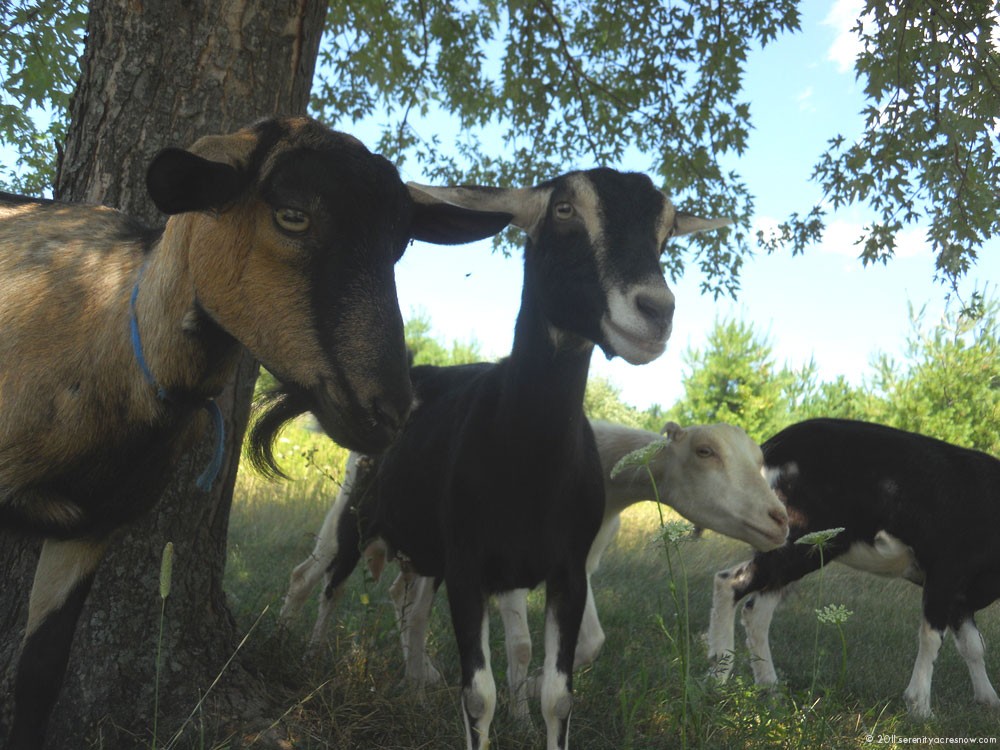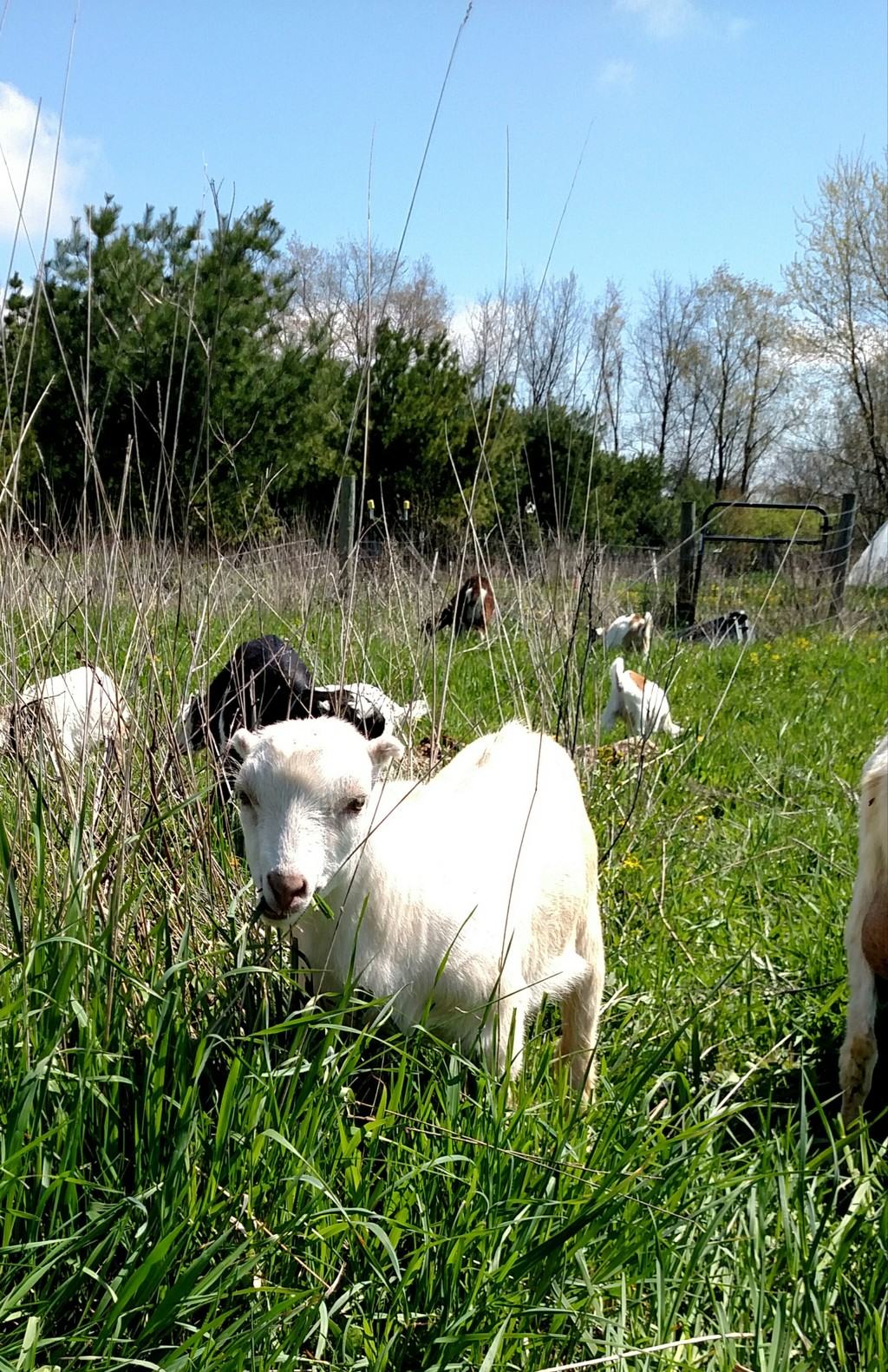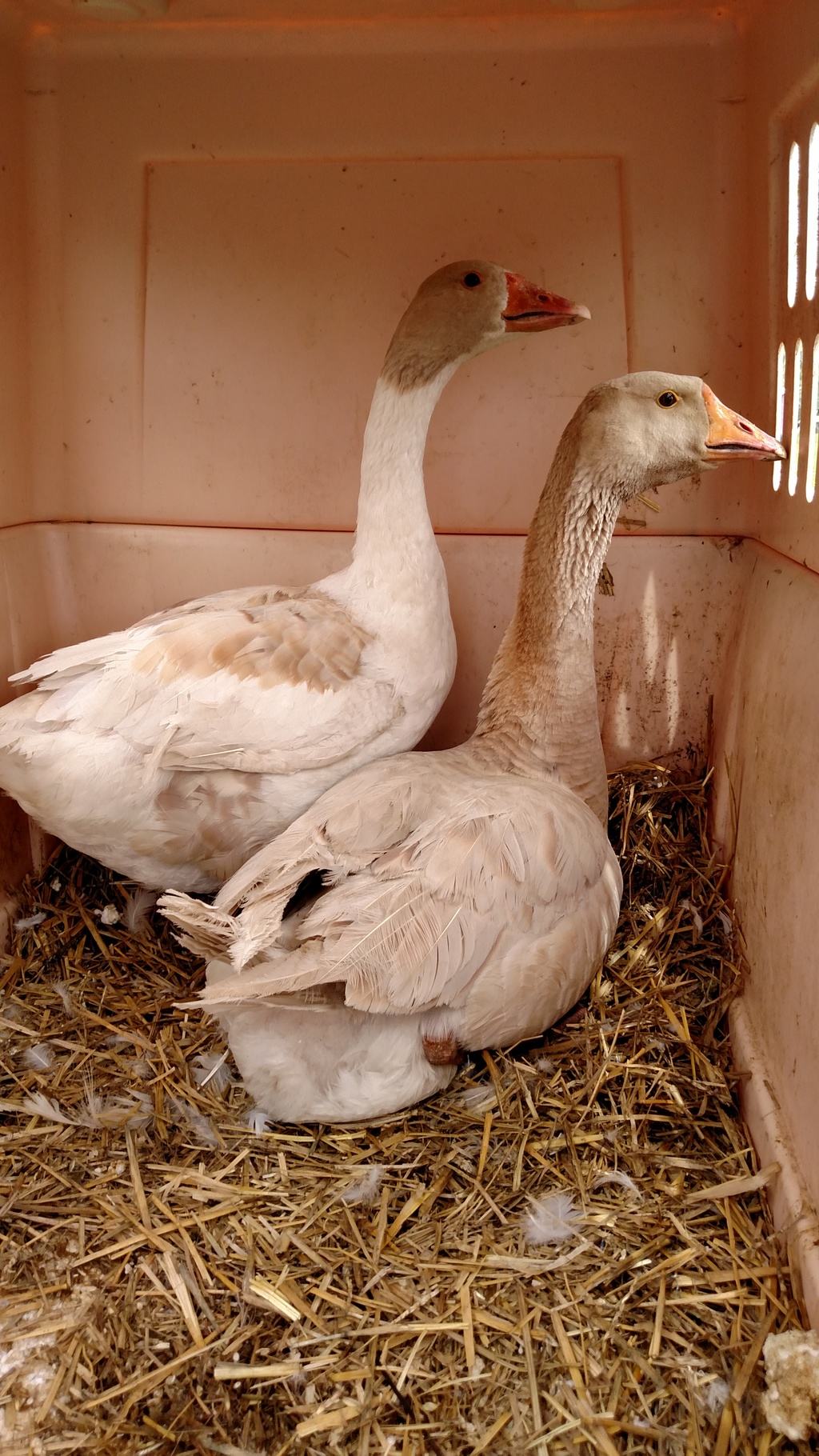Since we brought our first goats home and started sharing their photos and stories here, we’ve heard “I want a goat! Do they make good pets?” from several folks. And certainly, we appreciate the appeal of caprines – they are full of personality, can be affectionate, and can produce milk or meat, if you so desire. We’ve offered some information and advice in those individual conversations, but I think it’s about time I also talked about this here on the site. Goats absolutely have unique needs, so if you are starting to consider bringing them into your life, there are some things you need to know.
- Determine if goats are even allowed on your property. Some urban and suburban areas are now allowing for keeping a few hens for egg-laying, but that does not mean that the ordinances allow for a goat. And even if it’s not officially clarified on the books, and you are thinking, “better to ask forgiveness than permission,” you should really check into how your neighbors are going to feel about it. If they are opposed to the idea, they might be inclined to try and intimidate or harm your goats over the fence.
- Yes, I keep using the plural, goats. You really shouldn’t have a goat, you should have goats. These are herd animals who will not thrive if they are the only goat on a property. So you need to be able to take on at least two, and provide them the space, feed, health care, and attention that they need.
- Do not purchase an intact buck. Bucks can be sweet some of the time, but when they are “in rut” and wanting to breed, they are aggressive, stinky, and can be dangerous. I still have a scar on my leg from last year’s breeding season when the buck on our property rammed my leg. And he didn’t have horns, either. It just goes to show they don’t need those to defend themselves! Your best bet gender-wise for pets is to get neutered males – wethers. They have a very sweet disposition. But, make sure that wethers have been fixed at the proper time – right around the time they start to go into puberty. Wethers are at risk for urinary calculi, which can kill them, and if they are neutered too young, they are at even higher risk for this problem. But if they were neutered properly, the risk is much lower. By purchasing wethers as pets, you will probably be saving them from going to the slaughterhouse to be used as meat, too.
- Another important point to consider is the fence. There’s an old saying that goes, “If it won’t hold water, it won’t hold a goat.” If you only have a 3′ cyclone fence, rest assured, your goats will find a way to climb it. And a split-rail or post and rail fence is essentially just an unspoken challenge to your goat to show off their limbo skills. You need to have a multi-wire electric fence, or a woven wire fence in combination with a hot electric wire on the top and bottom. Oh, and make sure that those grid openings on the woven wire fence are not too big so that baby or adult goats can get their head stuck!
- Disbudding. You do not want a horned goat. Repeat after me, you do not want a horned goat. Horns will result in injuries to you, that goat, the other goat(s), other pets, children, neighbors, the postal carrier…you do not want a horned goat. Period. So do not purchase adult goats who have horns, because they would have to endure a painful, and possibly life-threatening procedure to have those removed. The proper method is to have the baby goats disbudded by a qualified person within two weeks of being born. So make sure that the goats you buy are already disbudded.
- You do, however, want a bottle baby. Meaning, that the goat was fed by a human with a bottle. This makes them much more cuddly and friendly toward humans. Additionally, it is a safeguard against certain caprine diseases that would otherwise have been passed along through the mother’s milk if the kid had nursed from her. Usually bottle babies are weaned by about eight weeks of age. Should you get them while they are still feeding from the bottle? I would advise against it, if you are getting them strictly as a pet, and particularly if you have a full-time job. You are going to have a hungry, needy goat as soon as you get home and are probably feeling a bit hungry and needy yourself! Let the farmer wean the goat before you take it on.
- Feed. You are going to need to provide your goats with plenty of fresh forage (if you have the property and tall grasses available), good quality hay, and fresh water. Do not believe someone if they say “Goats get the water they need from the plants they eat.” No, they do not. We’re going to assume you have wethers (neutered males) and so they do not need grain, as it will encourage those urinary calculi I mentioned earlier. Do not make the mistake of thinking you are getting goats to mow your lawn. They are not designed to graze low to the ground like sheep. Goats are meant to reach across (at head height) or up for food, not down. Grazing grasses that are shorter than 6″ tall also means that there is a higher load of parasites, which are a huge health risk to your animals. Make sure you are able to get good quality green hay for your goats – this is not the same thing as straw! Hay is dried grasses, like Timothy, Alfalfa, etc. Straw are the hollow stalks that are left over after wheat or oats are harvested, and do not have the same nutritive value. You use straw as litter/bedding, not food, although, don’t be surprised if your goats munch on some of it. They’re just being goats. It’s like junk food and they figure they are sneaking some on you.
- Parasite controls. Goats are vulnerable to many parasites. The best medicine is prevention, of course, but you will need to be prepared to treat them for any infestations they might suffer. Don’t encourage them to graze close to the ground, try to keep deer out of your area (they bring meningeal worms, which won’t hurt them, but will gradually paralyze and kill your goats), and don’t let goats graze on dewy grasses – let the sun dry those up. Depending on your access to a large animal veterinarian, you will probably want to learn how to perform injections on your goats in case they do get parasites.
- Do you have a large animal veterinarian willing to travel to your location, or will you need to bring your goat quite a distance to their location? If so, do you have the means to transport them there?
- Housing – do you have a safe place for your goats to sleep at night, lounge during the day, and be protected from the elements in severe weather? Even if you are in a relatively suburban area, remember, coyote populations are found everywhere, and because of all of the urban sprawl, their traditional home and hunting grounds have shifted around. They are adapting to urban environments- they’ve even been a problem in big cities, like Detroit! And oh, by the way, they think goat meat is delicious. So you need to protect your goats from predators at night. Heck, your neighbor’s dog might get a taste for goat. You just never know. Keep them safe.
- Capricious. Are you familiar with the term? It means given to whimsy, and sometimes erratic. And it is derived from the word “caprine.” Which means goats! So be prepared to have a pet that may not always agree with you on what it should be doing. The more time you spend with your goats, the better socialized and friendly they will be, but it’s fairly unrealistic to expect that you will walk them around the neighborhood on a leash like you might a German Shepherd. Be realistic about your expectations with your goats.
- Go to a reputable breeder for your goats. Goats can have diseases that you do not want them to have. You don’t want to form a bond with your goats only to discover that someone sold you some goats who are only going to live for a few months. Check to see if your state has a goat owner association, and get in contact with them for a list of breeders.
- Don’t think because you’ve read my post, you are now an expert on pet goats. Pick up a copy of Cheryl K. Smith’s Raising Goats For Dummies and read it at least once before you actually put the wheels in motion to bring home some goats.
 I have covered many, but not all of the points you need to review as you ponder bringing pet goats into your life. Have I discouraged you? Well, perhaps I’ve also saved you (and your family, and some goats!) a lot of heartache. If you really just want to spend some time with goats, check to see if there are any petting zoos or local farms that encourage “agritourism” in your area. Maybe there aren’t – but perhaps you could travel a bit and find one, and make a little vacation out of it. Agritourism is a great way to go spend a couple of days on a farm and interact with the animals, without the commitment required to have those animals as your own. Check out the Agritourism World directory to search for these types of destinations.
I have covered many, but not all of the points you need to review as you ponder bringing pet goats into your life. Have I discouraged you? Well, perhaps I’ve also saved you (and your family, and some goats!) a lot of heartache. If you really just want to spend some time with goats, check to see if there are any petting zoos or local farms that encourage “agritourism” in your area. Maybe there aren’t – but perhaps you could travel a bit and find one, and make a little vacation out of it. Agritourism is a great way to go spend a couple of days on a farm and interact with the animals, without the commitment required to have those animals as your own. Check out the Agritourism World directory to search for these types of destinations.
We are far from being goat “experts,” but we have been fortunate enough to have met many folks with years more experience than our own from whom we have learned so much. Because we have this channel to communicate, I wanted to take this opportunity to share many of those things we’ve learned with anyone considering goats as a pet! If you have any questions, we’d be happy to answer them to the best of our ability. If you decide to get pet goats, please share your stories and photos with us, too!






Leave a Reply